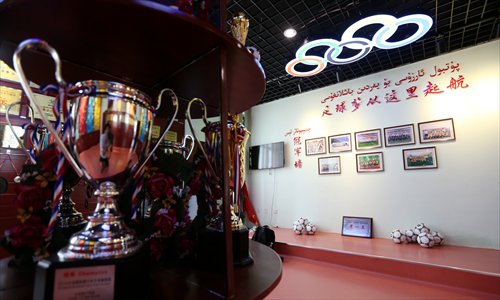
Trophies from all kinds of tournaments are displayed in Wuxiao's trophy room. (Photo: Cui Meng/GT)
Han kids wanted
There are around 3,000 students in Wuxiao, most of whom are Uyghur. Almost all the kids love football and play after class. The elite of them are a group of nearly 30 kids. Every day after school, others will leave and this group of kids will stay for a nearly two-hour training session on the playground. One of them is a Han player from Nantong, East China's Jiangsu Province.
"Normally all our players are Uyghur, but I'd like to see more Han kids in the team," Yali said. Most Han parents in Urumqi want their kids to focus on schoolwork, and don't want them to spend much time on football, which frustrates Yali.
"I want to have different kids in my team," he said. "When we go to play matches in other parts of the country, our players can't understand what the Han kids are talking about, since they don't speak Putonghua. So I posted messages in WeChat groups, asking Han parents across the country to send their kids here to play football with us."
Long after he sent the message, just one man got in touch with Yali and took his boy to Wuxiao. The 12-year-old Han boy, named Guchen Keyu, began to play football one year ago, and his father hopes he can get much better by playing in Wuxiao than in his hometown.
After living in Urumqi for just three weeks, Guchen could even talk with his new friends in Uyghur. They also gave him a Uyghur name, Kiyim, which sounds like his given name Keyu.
"My father left three or four days after taking me here" to go back to work at a clothing factory in Nantong. "I feel I've improved a lot at football after coming here," Guchen said, who is now living in one of Wuxiao's dormitories. "The training here is very tiring."
Yali said he's happy to have kids like Guchen in his team. "He can teach my players to speak Putonghua," said Yali. "And you know what, he really likes reading books. He's always reading and has many books. When my Uyghur players saw his books, they were really shocked." Yali said the Uyghur kids don't like reading normally, and he hopes the kids will fall in love with reading like Guchen.
Schoolwork is important
The real reason that Yali wants his players to read more is that he thinks schoolwork is more important than football.
"Most kids in Xinjiang don't like schoolwork, and even their parents don't think reading books is useful," Yali sighed.
He said a lot of kids don't continue their studies after primary school. Their parents want them to make money as soon as possible so as to ease their own heavy burdens.
A lot of his players are from southern Xinjiang, where 83 percent of the 2.61 million Xinjiang residents that are officially designated as "poverty-stricken" live. He said a lot of kids don't continue their studies after primary school. Their parents want them to start making money as soon as possible to ease their own heavy burdens.
"Most of the kids will not become professional players in the future. If they quit school so early, what can they do? They can only do some easy jobs, making little money. Some might even turn to crime."
Yali thinks schoolwork is still important even for professional footballers.
"In China, most professional athletes are not well educated," he said. These players might have won world acclaim and Olympic medals during their playing days, but after retirement, a lot of them lead a hard life as they lack other skills. Some have even had to sell their medals to make some money.
"But players in Europe and the U.S. are different," Yali continued. "A lot of them are college students, which also makes them understand their sport better and help them play better. And after their retirement, they can easily start in other businesses."
So in Wuxiao, if a kid is not doing well in classes, they will not be allowed to play football with the team. Yali only allow them to train with the team if they've done well enough in classes.
"A lot of people have asked me, 'Why are Xinjiang kids are so good at playing football in primary school, but few of them become professional players in the end?'" Yali said. "I blame the different perceptions and customs. A lot of them get married at 17 or 18, and begin to drink and smoke at an early age. That way they're ruined."
Yali really hopes reading more books and doing better in school will help his players lead a better life in the future.


















































